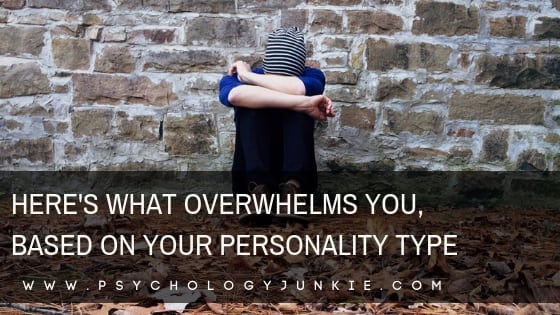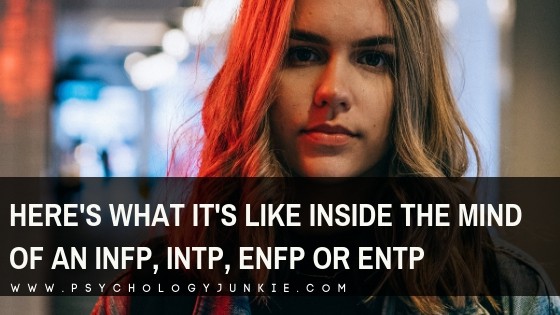Here’s What Overwhelms You, Based On Your Personality Type
Have you ever wondered if different personality types are overwhelmed by different things? Do you ever find yourself getting anxious and irritable in situations that other people enjoy? Here’s a look at the things that overwhelm each personality type.
Not sure what your personality type is? Take our new personality questionnaire here. Or you can take the official MBTI® here.

Here’s What Overwhelms You, Based On Your Personality Type
The ENFP
ENFPs get overwhelmed when they have to conform to a routine. These types like novelty, change, innovation, and big picture ideas. They hate knowing what’s going to happen from one day to the next and they tend to feel stuck in a highly structured lifestyle. Having to hone in on a lot of practical, concrete details also tends to be overwhelming to them. They see broad impressions of things rather than the fine details. Things like proofreading, washing dishes, or doing quality control can all overwhelm them. They want to use their imagination to look forward and generate possibilities. Focusing all their attention on the details of the moment is stifling to them.
Related: What ENFPs Do When They Get Really Stressed Out
The ENTP
ENTPs and ENFPs are drained by very much the same things. A strict routine, predictability, and a focus on practical details makes them bored and/or overwhelmed. These types desire change, spontaneity, innovation, novelty. There’s nothing worse to an ENTP than knowing exactly what’s going to happen in the next few years and not having the freedom to change anything. They also feel overwhelmed when they are surrounded by people who are making illogical decisions based entirely on their emotions or their personal values. Not being able to get through to anyone in a logical fashion can make them feel aggravated and overwhelmed.
The INFP
INFPs feel overwhelmed when they are put in charge of organizing or directing other people. These types much prefer to work independently and can get overwhelmed with telling other people what to do or structuring and organizing a big project or event. They can also get overwhelmed by routine, meaningless work. If their career doesn’t have any personal significance to them or any creative opportunities they can feel stressed and edgy throughout the entire day.
Related: 12 Stress-Busting Techniques for INFPs
The INTP
INTPs feel overwhelmed when they are in emotionally charged environments. When the people around them are crying, yelling, or trying to bond through heart-to-heart emotional conversations, this can make them feel on edge. It only makes things worse if they are expected to express their emotions spontaneously or take sides in an impassioned, illogical argument. They tend to feel out of their element, confused, and stressed in these atmospheres.
The ENFJ
ENFJs feel overwhelmed when they have to manage a lot of impersonal details or critique the performance of other people. Giving job performance reviews, dishing out criticism, or keeping track of a lot of facts and figures can be simultaneously overwhelming and draining. They are usually drawn to careers and lifestyles that involve encouraging and inspiring people. If they are stuck in a path that involves a lot of impersonal work with no big-picture goals they can get very overwhelmed and depressed. They can also get overwhelmed if they are surrounded by a lot of negative emotions. Because they pick up on other people’s emotions so easily they can find emotionally tumultuous atmospheres very stressful.
The ENTJ
ENTJs feel overwhelmed when they are in emotionally-intense atmospheres. It is especially frustrating if this is creating a roadblock to achieving goals or getting much-needed work done. When a loved one is making an emotional display or accusing them of being cold or unfeeling it can put ENTJs in a state of extreme stress. Handling the emotions of other people is an area where they feel out of their depth and confused. They tend to feel guilty about not being able to offer more emotional support to their loved ones, and they try to drown this feeling of incompetence by offering logical solutions. Unfortunately, this tends to make emotional situations worse rather than better!
The INFJ
INFJs feel overwhelmed when they are in noisy, bright, busy environments. Trying to think clearly in an atmosphere that is loud, disruptive, or flashy can make them feel overwhelmed and unable to think. Having to react spontaneously to sudden changes can also overwhelm them. They tend to need more transition time than many other types and will feel caught off guard by situations where they are expected to suddenly switch gears. Being asked to drive in an unfamiliar environment, to give a speech, or to respond to an unexpected question can all be overwhelming situations for INFJs. They also get overwhelmed when the people they care about are in conflict. They absorb the emotions of the people around them and will find themselves burdened with everyone’s emotions and trying desperately to regain harmony.
Related: Understanding INFJ “Grip” Stress
The INTJ
INTJs, like INFJs, get overwhelmed by busy, loud, flashy environments. These types need quiet and peace in order to process ideas and data in their preferred way. They can find themselves unable to think or analyze effectively if there is too much commotion around them. They also tend to get overwhelmed in situations where they have to get something done, but the people around them are lazy or incompetent. Having to work with people who complain, procrastinate, or who seem unmotivated and slow really gets on their nerves.
Related: 12 Stress-Busting Techniques For INTJs
The ESFP
ESFPs get overwhelmed when they are stuck in long, meandering conversations that have no practical purpose or personal connection. Having to sit still and listen to someone lecture about theories or details that are irrelevant to their own lives is mind-numbing for them. They’d much rather be DOING something, or at least having a conversation that is personal and collaborative. ESFPs also get overwhelmed by being around people who are very critical or who complain a lot. As natural optimists, ESFPs can get frustrated when they are surrounded by people who are unwilling to see positive opportunities in everyday life.
The ESTP
ESTPs get overwhelmed by being inactive or slowed down by other people. Whether they’re trying to get somewhere and they’re surrounded by bad drivers, or they are trying to accomplish a goal and the people around them keep getting sidetracked by irrelevant topics, ESTPs want to move with purpose. They like to always be active, exploring, accomplishing, or embarking on an adventure. Being stagnant is extremely aggravating to them.
The ISFP
ISFPs get overwhelmed by being controlled or micro-managed. They hate having a strict routine or structure to conform to without any room for creativity or new experiences. They also get overwhelmed when they have to do a job that has no personal significance to them. They want to feel like they spend their days making a positive impact on others or doing something creative or exciting. Sitting at a desk crunching numbers, filling out paperwork, or doing menial, mundane tasks is draining to them.
The ISTP
ISTPs get overwhelmed when their personal space is infringed upon without warning. When they are enjoying their alone time and people “barge in” on them this irritates them and they can lose their focus on what they were doing. They also get overwhelmed in emotionally-charged situations where they are expected to express themselves emotionally in front of others. Because their inferior function, extraverted feeling, is what they use to express emotions, they can feel inept or awkward when they try to do it. They often feel the same way when they are forced to conform to social norms that make no logical sense to them.
The ESFJ
ESFJs get overwhelmed when they are in the midst of a conflict but don’t have the time to process it or resolve it. Leaving a conflict “hanging” is extremely stressful for them because they naturally seek either harmony or closure. This is especially frustrating if the person they are having a conflict with is continually around them, but unwilling to resolve it. They also feel overwhelmed whey have to work through a lot of detailed, analytical activities for long periods. When they feel that there is no personal relevance to what they are doing and there is no real-world application for it, they can get bogged down with the details and feel bored with the overall experience.
The ESTJ
ESTJs get overwhelmed when they have a project to accomplish, but they are forced to deal with the emotions or complaints of other people. Being surrounded by sluggish, distracted, or emotionally distraught people can put them on edge. They tend to struggle with knowing what to say, especially when they feel an urge to get back to focusing on an important project or deadline. They also feel overwhelmed when they are trying to get something done but the people they work with are procrastinating or constantly getting sidetracked by unrelated matters.
The ISFJ
ISFJs get overwhelmed when they have deadlines approaching quickly and there are a lot of people counting on them to get something done. It is especially difficult if the rules and expectations are constantly changing or the people they have to work with are undependable or unreliable. They also get overwhelmed when they are thrown into new environments and situations without any chance to prepare. Lastly, ISFJs are overwhelmed by conflict situations. Being around negative, critical people or people who are fighting is very stressful for them. They tend to pick up on the emotions and moods of others and will find it hard to relax until harmony has been restored.
The ISTJ
ISTJs get overwhelmed when they are contradicted by people who reject factual data or their own experience. When they are trying to express an opinion or plan, being constantly derailed by people who bring up hypothetical situations or impractical ideas is intensely aggravating. They also get overwhelmed when they are interrupted or they are spontaneously forced to adapt to an unexpected situation. They need time to mentally prepare for change and hate being pushed into situations they are unprepared for.
What Are Your Thoughts?
Let us know in the comments!
Find out more about your personality type in our eBook, Discovering You: Unlocking the Power of Personality Type.
This article contains affiliate links.










Eerily accurate!
(ISTJ)
INTJ: wow, that is 100% spot-on. At work, I needed to finish a report. My office mate had a visitor and they kept on chatting away about non-work related stuff. That has completely distracted me and I couldn’t find my concentration. To keep the peace at work, I decided not to chase the visitor away.
This INFP is energized by leading others; NOT overwhelmed at all. However , routine and too much structure does do me in
I can identify with several of these examples, so… perhaps you mean that the example given is the predominant stressor for that personality type?